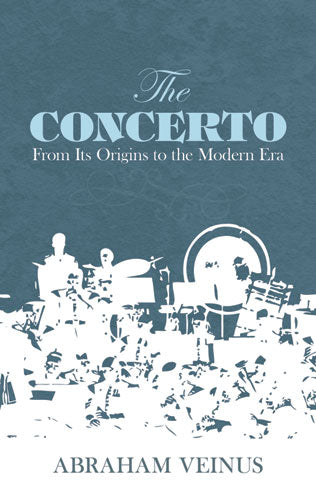
Dover Publications - 486
The Concerto: From Its Origins to the Modern Era
Publisher: Dover Publications
Quantity:
Pickup available at Juilliard Store
Usually ready in 4 hours
The Concerto: From Its Origins to the Modern Era
Juilliard Store
Pickup available, usually ready in 4 hours
144 West 66th Street
New York NY 10023
United States
Choose options
Quantity:
Pickup available at Juilliard Store
Usually ready in 4 hours
The Concerto: From Its Origins to the Modern Era
Juilliard Store
Pickup available, usually ready in 4 hours
144 West 66th Street
New York NY 10023
United States
Quantity:
Pickup available at Juilliard Store
Usually ready in 4 hours
The Concerto: From Its Origins to the Modern Era
Juilliard Store
Pickup available, usually ready in 4 hours
144 West 66th Street
New York NY 10023
United States
"Sound history, intelligent evaluation, and a good literary style."—Library Journal
"Colorful and interesting … a very valuable addition to our rising literature in musicology."—Saturday Review
"An excellent and eminently readable history."—New York Herald Tribune
This authoritative survey constitutes the first thorough English-language exploration of the concerto as a musical form. The musical form's long and colorful history is explored in critical terms accessible to lay readers as well as specialists, forming a listener's guide, an important musicological study, and a fascinating reading experience.
Examining the social, economic, and personal factors that influenced the concerto's growth, author Abraham Veinus also summarizes the contributions of theorists, composers, and musicians and defines the genre's terms and the changing nature. He traces the early development of the concerto as well as that of the concerto grosso, the early solo concerto, classic forms, Beethoven's characteristic use of the form, the Romantic concerto, and the modern concerto. A pleasure to read and a valuable reference, this volume is an ideal companion for musicians, music students, and lovers of classical music.
"Colorful and interesting … a very valuable addition to our rising literature in musicology."—Saturday Review
"An excellent and eminently readable history."—New York Herald Tribune
This authoritative survey constitutes the first thorough English-language exploration of the concerto as a musical form. The musical form's long and colorful history is explored in critical terms accessible to lay readers as well as specialists, forming a listener's guide, an important musicological study, and a fascinating reading experience.
Examining the social, economic, and personal factors that influenced the concerto's growth, author Abraham Veinus also summarizes the contributions of theorists, composers, and musicians and defines the genre's terms and the changing nature. He traces the early development of the concerto as well as that of the concerto grosso, the early solo concerto, classic forms, Beethoven's characteristic use of the form, the Romantic concerto, and the modern concerto. A pleasure to read and a valuable reference, this volume is an ideal companion for musicians, music students, and lovers of classical music.
Reprint of the 1963 revised edition published by Doubleday, Doran and Company, 1945, and Cassell and Company Limited, 1948.
